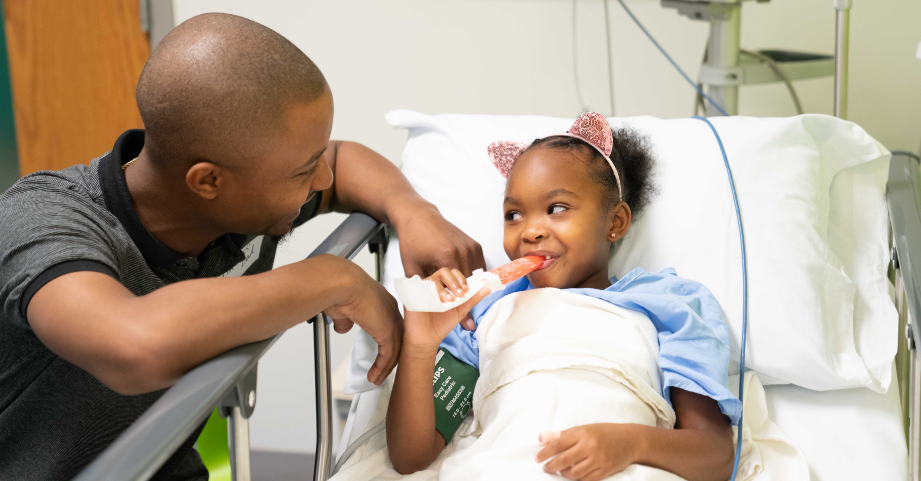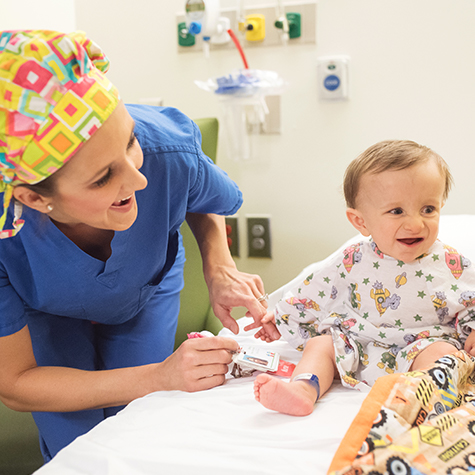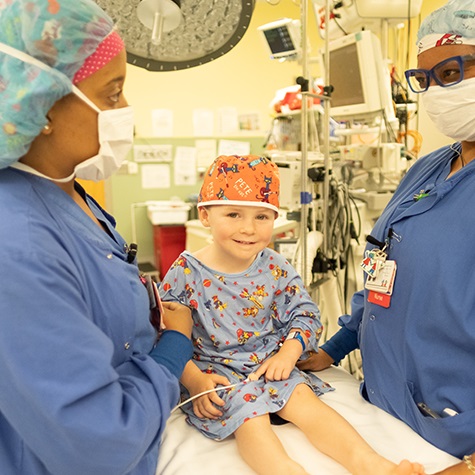Enhanced Recovery After Surgery for Kids and Teens
Updated 1/27/23
Our team looks at past patients and their recovery experiences after surgery and the latest research studies to help us create plans for similar patients who are having the same procedure. These guidelines have helped us reduce complications, better manage post-surgery pain and get kids back to activities sooner. This process is called Enhanced Recovery After Surgery (ERAS).

Surgery can be scary for kids and teens. Our team understands that they might feel anxious about what to expect. We recommend:
- Talking to your child or teen about what to expect before surgery.
- Bringing a comfort item like a stuffed animal or a favorite blanket, or for older kids and teens, cell phones or tablets, to help ease anxiety.
- Telling us if your child is having anxiety the day of surgery. Our pediatric specialists know how to talk to kids and teens about their procedure and can provide a coping plan, so they have less stress before surgery.
We will typically ask your child to stop eating 8 hours before surgery, but we encourage patients to drink clear liquids up to 2 hours before surgery. This helps children feel less hungry and keeps them hydrated, which helps them recover faster after surgery. Your child’s care team will let you know what kinds of liquids your child or baby can have.
Our team of doctors, anesthesiologists, pharmacists and nurses are focused on prescribing medications and doses that will work best for your child’s age and procedure.
- Pain Plan: Our team works with you to create a pain management plan that is best for your child.
- Medication: Our team uses a combination of medicines and a schedule, so your child is receiving the right dose at the right time during recovery.
- Prescription medications: Opioids are strong pain medicines that may be given after surgery, and need to be closely monitored. Our team understands how opioids can affect growing bodies and can make recovery slower. Opioids can cause your child to be tired or confused; they can also cause problems with breathing, constipation, nausea or vomiting. Our team carefully prescribes opioids to help ease pain while limiting the amount and length of time so kids and teens can get back to activities sooner.
- Over-the-counter medication: Over-the-counter medicines are very effective in easing pain and helping reduce swelling after surgery. These may include acetaminophen and anti-inflammatory medicine or NSAIDs (Nonsteroidal anti-inflammatory drugs) such as ibuprofen. Our team will give your child these medications or specific directions for taking them after surgery.
- Local anesthetics or nerve blocks: Our pediatric pain specialists may use special medicine that helps numb parts of the body to help ease pain and help with recovery.
- Distraction techniques: Our team of specialists are trained to provide a variety of distraction techniques such as listening to music, drawing or calling a friend.
Our goal is to get children safely home and back to their normal activities as soon as possible. We will work with you to create a plan that safely gets your child moving and eating after surgery. This plan may include:
- Removing lines and tubes that were placed for surgery, such as IVs or breathing tubes, so your child can move more easily.
- Getting up and moving soon to help your child’s lungs, to prevent complications like blood clots, and to help digestion.
- Eating and drinking easy-to-digest foods to help your child’s body get the right nutrients for recovery and to help digestion get back to normal.

Some facilities can’t guarantee a pediatric anesthesiologist for your child—we do.
While some hospitals may not be staffed to meet this need, at Children’s, every baby, child and teen receives care from a pediatric anesthesiologist who understands best practices for growing bodies.
Learn moreEnhanced Recovery After Surgery Explained
-
Helping Kids Recover Better After Surgery
Learn how we work with parents to create unique care plans that get their child back to activities quickly and safely after surgery.

We are the first facility in Georgia with a Level 1 Children’s Surgery Verification.
We have earned Level 1 status from the American College of Surgeons for Children’s Surgery Verification—its highest designation. No other hospitals in Georgia have achieved this level. So when your child needs surgery, you can take comfort in knowing he is in a facility that meets the highest distinction.
Learn moreContact Us 404-785-KIDS (5437)